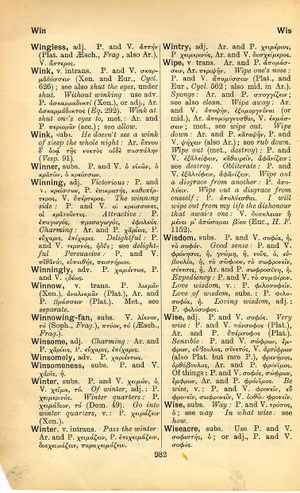wise
Έγ', ὦ ταλαίπωρ', αὐτὸς ὧν χρείᾳ πάρει. Τὰ πολλὰ γάρ τοι ῥήματ' ἢ τέρψαντά τι, ἢ δυσχεράναντ', ἢ κατοικτίσαντά πως, παρέσχε φωνὴν τοῖς ἀφωνήτοις τινά –> Wretched brother, tell him what you need. A multitude of words can be pleasurable, burdensome, or they can arouse pity somehow — they give a kind of voice to the voiceless.
English > Greek (Woodhouse)
adj.
P. and V. σοφός.
Very wise: V. and V. πάνσοφος (Plat.), Ar. and P. ὑπέρσοφος (Plat.).
Sensible: P. and V. σώφρων, ἔμφρων, εὔβουλος, συνετός, V. ἀρτίφρων (also Plat. but rare P.), φρενήρης, ὀρθόβουλος, Ar. and P. φρόνιμος.
Of things: P. and V. σοφός, σώφρων, ἔμφρων, Ar. and P. φρόνιμος.
Be wise, v.: P. and V. φρονεῖν, εὖ φρονεῖν, σωφρονεῖν, V. ὀρθῶς φρονεῖν.
subs.
Way: P. and V. τρόπος, ὁ; see way.
In what wise: see how.

